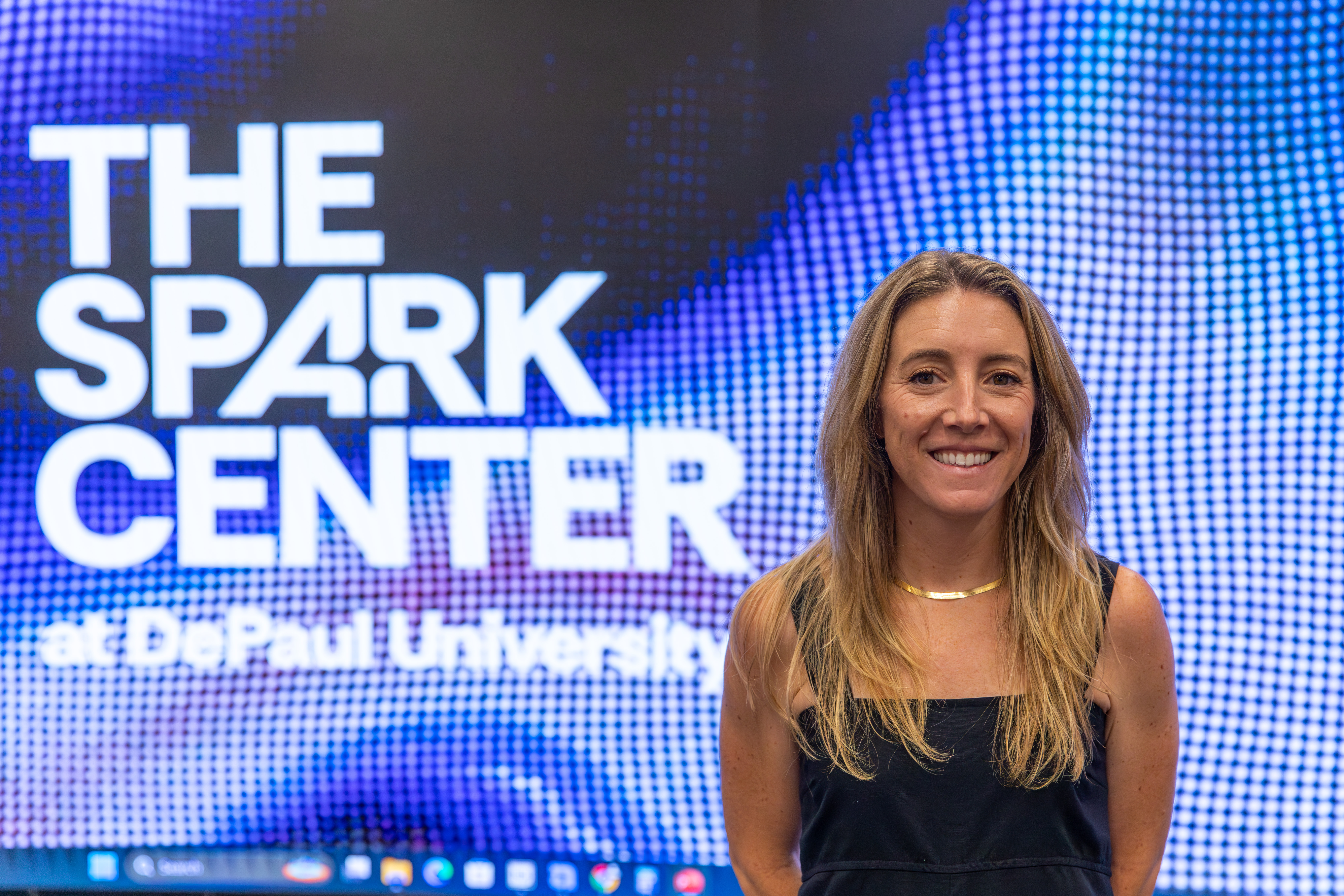 LeAnne Wagner, Director of the SPARK Center (Keeton Holder/DePaul University)
LeAnne Wagner, Director of the SPARK Center (Keeton Holder/DePaul University) Located on DePaul's Loop Campus, the SPARK Center is now open to the university community. Located on the 8th floor of the DePaul Center, the center is poised to foster collaboration across disciplines by leveraging data science, design and AI.
Leading the center as director is LeAnne Wagner, an innovator and faculty member in DePaul's School of Design. Wagner also leads PUSH Studio, which envisions equitable, ethical futures by bringing together design and emerging technology. She also directs and manages grant-funded research projects that investigate the applications of human-centered design methodology and integration of technology in K-8 educational settings.
SPARK stands for Strategic Partnerships for the Advancement of Research and Knowledge and is an initiative of Designing DePaul. In this Q&A, Wagner discusses the SPARK Center, its capabilities, fall events and how the DePaul community can get involved.
What is the SPARK Center and its capabilities?
At a visionary level, the SPARK Center is a data-centric driver of civic solutions and a catalyst for positive change in the heart of Chicago. We envision new ideas for supporting communities through data, research and education. We use storytelling and data visualization to turn our research into digestible, comprehensive materials that invite non-experts into informed and representative conversations that shape the future. Capability like this has the potential to have a far-reaching impact on the community and the creation of solutions that benefit our local, national and global communities.
What should DePaul community partners know about the SPARK Center?
Our goal is to help community partners level up and see new possibilities with the support of DePaul’s expert faculty and our investment in cutting-edge tools. We want to solve complicated problems proposed by community partners using data, dynamic visualizations and storytelling. It is an unbiased convening space for academia, community and industry to come together and make decisions that impact community. By using data visualization, we can make informed decisions in an environment that uses quantitative and qualitative data for discussion.
Can you discuss the SPARK Center's data programming?
Two of the SPARK Center’s main objectives are data vision projects and data literacy certification. Data vision projects are interdisciplinary, convening industry, community, government and academia. They focus on community impact through research, predictive analytics and data visualization to guide discussion, decisions and policy. The certification program features data-related courses for nonprofit and community leaders to equip themselves with the tools and resources to support and empower initiatives. Partners that earn certificates have the option to further engage with SPARK resources and support.
How can data help solve problems effectively?
Data can help inform decisions and create a clear, empirical platform for discussion and debate. Data can also be used to help imagine potential future solutions and scenarios through predictive analytics and AI modeling, then tell that story through visualization, storytelling and design foresight. We hope through our events and training, we can give diverse groups within the university and in our community the opportunity to do this. The ability to peer into the future with all the stakeholders collectively is a powerful tool.
What are some challenges associated with visualizing data, and what resources does DePaul provide to address them?
It can sometimes be challenging to comprehend data visualization. At its worst, it is only legible to those trained in the subject matter. Our goal is for researchers, community groups and others to come to us with their data, and to collaborate. We want to create visualization materials that communicate the results of research in a way that makes findings and data consumable to non-experts. We believe this is important so discussions and decisions can be truly inclusive to all involved stakeholders.
We are excited about expanding on traditional data visualization methods to look beyond charts and graphs, as well as to work with multimedia faculty to create new data storytelling methods through mediums like documentary, VR and gaming to name a few.
What can the DePaul community anticipate in the upcoming fall season?
We just had an upcoming event with DePaul faculty who completed a NASA grant. We will also have election night coverage with DePaul journalism faculty and students and open house sessions for faculty and students. We are also available to support projects and collaborate on grant proposals related to data and visualization. Stay tuned for those as well as upcoming partnership announcements.
How can the DePaul community utilize the space offered by the SPARK Center?
We welcome classes, presentations and meetings. Visit the SPARK Center website to learn more or schedule a visit.